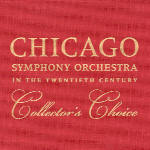In 1991 the Chicago Symphony celebrated its 100th anniversary by issuing a blockbuster 12-CD set culled from the orchestra’s rich trove of broadcast performances, with a few rare commercial recordings thrown in for good measure. The anthology’s success instigated similarly conceived boxed sets from major American orchestras. In addition, annual releases in the Chicago Symphony’s “From The Archives” series continue to bring forth archival treasures.
Aptly titled “Collector’s Choice”, the present collection places slightly more emphasis this time on guest conductors. With the exception of Raphael Kubelik, (the subject of a recent “From The Archives” retrospective), all the orchestra’s music directors are also included, represented by works they did not commercially record. For the most part, the material is well chosen, varied, and often revelatory. A previously unknown 1948 Beethoven First symphony, for instance, adds a major work to Fritz Busch’s pitifully small orchestral discography. His bracing, sharply accented reading recalls Toscanini’s opera buffo approach, but from a less driven vantage point. Hans Rosbaud’s deliciously pointed, balletic stroll through Strauss’ Suite from Der Bürger als Edelmann (three movements were omitted from this 1960 TV transmission due to time constraints) makes you regret that his 1962 Chicago Mahler Ninth wasn’t broadcast. Thank goodness Jean Martinon’s nimble, panther-like traversal of the same composer’s sprawling Third from a 1967 concert was preserved, and in clear, dynamic studio quality sound to boot. The Chicagoans play like gods, with a kind of fervency and commitment that leave the orchestra’s subsequent studio versions under Levine and Solti at the starting gate. You’d never know that this was the orchestra’s first encounter with the score.
Given Malcolm Sargent’s affinity with Vaughan Williams, it’s surprising that he didn’t record the composer’s popular, tuneful London Symphony. This omission is winningly rectified in a July 1967 Ravinia festival broadcast, taped just months before Sargent’s death. Likewise, Klaus Tennstedt was renowned for Bruckner, yet only recorded the Fourth and Eighth symphonies during his EMI tenure. The late conductor unravels the Seventh symphony’s gothic dimensions in rolling, clear paragraphs. The orchestra’s long-limbed refinement here contrasts with Paul Hindemith’s more robust account of the first movement from a 1963 TV broadcast.
Certain selections offer interesting glosses on familiar recordings. Bruno Walter’s 1958 Schubert “Unfinished” Symphony embraces a wider parameter of nuance and tempo fluctuation compared to his brooding New York Philharmonic stereo edition. Charles Munch’s justly acclaimed 1965 Lamoureux Orchestra recording of the Roussel Third symphony yields to the conductor’s 1967 Chicago broadcast. Ditto for János Ferencsik’s taut, clear-headed Beethoven Seventh–a finer achievement than his serviceable mid-1970s Hungarian State Orchestra version. I’ll take the booklet annotations on faith that Erich Leinsdorf’s 1986 Preludes and Interludes from Debussy’s Pelleas et Melisande scores over his 1946 Cleveland Orchestra 78s, which I haven’t heard. As for Kyrill Kondrashin’s over-the-top romp through Prokofiev’s Third symphony (recorded 1976), I waver between the Chicago Symphony’s fearsome accuracy and the subtler colors Kondrashin draws from the Concertgebouw Orchestra (a 1975 concert recording released on Philips, no longer available).
Archival performances are also valuable to the extent that they belie one’s prejudices in regard to favorite performers. A solidly stylish Beethoven Second, for example, confounds Leopold Stokowski’s “free-spirit” persona. By contrast, the “dictatorial” Fritz Reiner personalizes Tchaikovsky’s Fourth symphony with unbuttoned rhetoric and liberal tempo fluctuations. Reiner whips up a storm in the Finale’s coda that can best be described as, well, Stokowskian!
To the producers’ credit, “Collector’s Choice” does not skimp on 20th century music. Some may find Ralph Shapey’s Rituals (conducted by the composer) less arid than I do, but I prefer the bold austerity Georg Solti brings to Elliott Carter’s Variations for Orchestra over James Levine’s proficient, somewhat slick Chicago reading (DG). But Levine really makes Copland’s Billy the Kid Suite swing, and Marian Anderson is a moving narrator in the same composer’s Prelude for a Solemn Occasion (with Seiji Ozawa at the helm). Leonard Slatkin’s 1986 William Schuman Third symphony comes close to matching Bernstein’s full-throttled New York Philharmonic recording (Sony). The orchestra’s one-time assistant conductor Kenneth Jean leads John Corigliano’s Campane di Ravello, a bustling three-minute curtain raiser composed to celebrate Solti’s 75th birthday.
Some nits to pick: It’s nice to have Ernest Ansermet leading his delicate orchestrations of Debussy’s Six Antique Epigraphs, but I would rather have seen this underrated conductor represented in more substantial fare. And Carlo Maria Giulini is given short shrift, although excerpts from Mozart’s Divertimento No. 11 showcase first-chair oboist Ray Still’s patrician artistry. Daniel Barenboim is not going to convince me that Beethoven’s Christ on the Mount of Olives is a neglected masterpiece, but he certainly gives his all in this darkly lit, concentrated 1996 performance. I also don’t expect to listen often to Busoni’s odd Lustspiel Overture or his twisted retooling of Mozart’s Overture to The Abduction from the Seraglio, no matter how well Barenboim conducts them.
A few historic curios also deserve mention. Artur Rodzinski zips through the Act 3 Prelude to Wagner’s Lohengrin as if he were accompanying a silent comedy film. Rodzinski’s predecessor Désiré Defauw does an outstanding job with Bizet’s seldom-encountered Patrie Overture. To end at the beginning, the collection kicks off with Frederick Stock leading an augmented orchestra and a chorus of more than 2500 voices in Wagner’s “Hail, Bright Abode” from Tannhäuser Act 2. The selection opened a concert that was part of Chicago’s A Century of Progress Exposition in May 1933. It’s an interesting historic document, but musically speaking let’s just say that you had to be there. All in all, an important and desirable treasure trove, assembled, produced, annotated, and remastered to the highest possible standards, and available only from the Chicago Symphony Orchestra [http://www.chicagosymphony.org]. [6/4/2000]
































